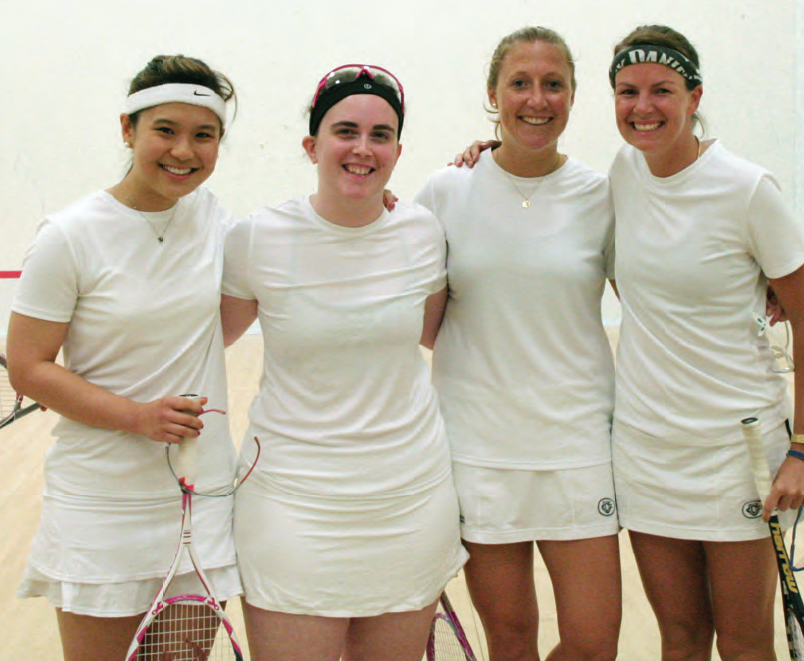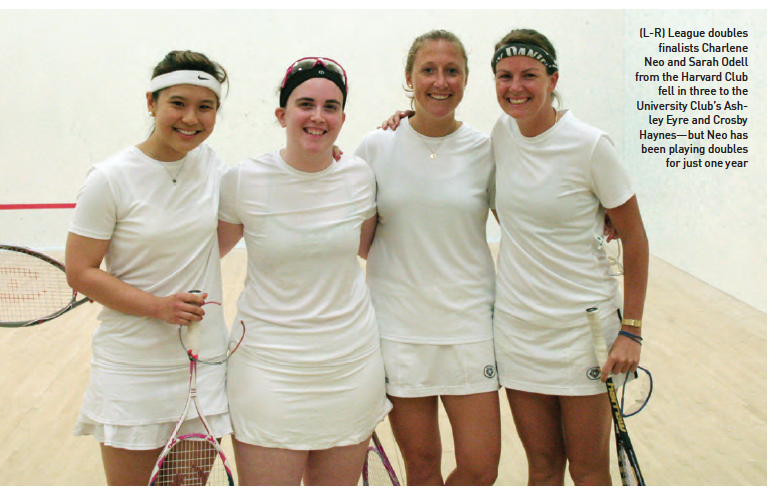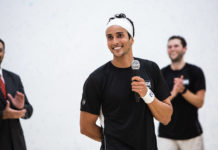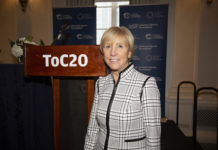
By Tracy Gates
I am a Flamingo. Well, I was for a few months this past spring, as a team member on the inaugural women’s hardball doubles league in NYC. Flamingoes are better at fishing than squash, I guess, so that is why I am in business attire in the fourth row behind the court and not in a cool white t-shirt with my name on the back on the court. As a consolation of sorts, I am drinking complimentary Miller Light and snacking on canapés while craning my neck to see past the guys in the row in front of me and into the University Club’s doubles court where the league finals are taking place. Friends of mine from the Harvard Club, Sarah Odell and Charlene Neo, are playing UClub’s formidable Ashley Eyre and Crosby Haynes and I want to see more than the back of some guy’s head. A chair opens up in the front row and I nab it; squash reflexes are handy off-court as well . . .
Hardball doubles is new to me, but I’ve quickly become a convert—er, a fan. After making a hugely fun debut in the Century Doubles Tournament this spring (March issue of Squash Magazine), I made sure I kept playing, saying yes to every doubles invite I received, including a women’s league organized by Sarah Odell. Over the course of six weeks, 40 women took to the courts at UClub and CityView Racquet Club in Queens, and no matter what their level of doubles experience, had a great time.
Every town with one or more doubles courts should have a league organizer as enthusiastic as Ms. Odell. I have never played in a women’s doubles league before because there was no such league. People probably said—Oh, there aren’t enough women playing doubles. And—who’s gonna let us use their courts? Heck, people probably didn’t even think about asking such questions. But Ms. Odell is not a it-can’t- be-done person. Not even close. And that’s why about 50 of us gathered at University Club at the end of June for the end of league finals. And in an equally inspired move, Ms. Odell asked some local pros to play an exhibition match.
It was also pretty gutsy. I wouldn’t want to go on court after watching the likes of Lee Belknap, Narelle Krizek, Meredeth Quick and Emily Lungstrum. These women may be past their junior years, but they are seriously in shape and have lightening fast reflexes. Much of the time they stayed well in front of the T and hit volley after hard volley. My bleary stare-at-a-computer-all-day eyes could barely keep up. They could also hardly believe what Narelle told me later . . . that Lee had had a hip replacement. Lee is tall and blond and Amazonian; if it doesn’t already, her surgeon’s office should show movies of her playing squash to potential patients.
The match was an extremely close fought battle, albeit a friendly one. Belknap and Krizek won the first two games in pretty convincing fashion. Krizek was the outstanding player of the evening, putting any loose ball away with unbelievable accuracy. But Lungstrum—who must eat spinach morning, noon, and night—also had great short kills off the back wall and Quick started hitting gasp-inducing reverse angle volley winners whenever the opportunity presented itself. These two quickly figured out that they would not win by hitting the ball to Krizek on the left wall and started lifting the ball over Belknap and keeping it on her side of the court. The strategy worked and Quick and Lungstrum came back to tie the match at two all. The fifth game was the best of the match with both sides playing incredibly well and hitting great winners. This game went to extra points and was closed out by Krizek and Belknap. By the end it was all I could do not to grab a racquet and jump on the court myself. These women make you want to play.
I overheard someone later describe the first match as ‘sexy’ and the second as not. Which, yes, sounds somewhat sexist, but interesting nonetheless. I could see the point, not for who was playing, but for the crispness and beauty of the shots. The second match was definitely less graceful, but to my novice eye, these women were also incredibly inspiring. I will never ever ever get close to playing like a blond Amazon with a bionic hip. Never. But the finals looked fun and hard and fast, too. They had a lot more at stake and were making more errors (I lost count of how many balls hit UClub’s famously low ceiling). But that’s what being in a finals match in front of a crowd of people can do to you. The University Club team pulled out the win in three. Owing to a touch more experience. Possibly fewer nerves. But Ms. Neo of Harvard had only begun playing doubles this year and has volley drops most of us could only dream of, so next year I’m sure she’ll be back with fewer errors and more skills.
As will many other women I hope. Chatting with a few other female players between matches, I was surprised to learn that many in the league don’t have doubles courts at their club. Playing in league matches was their main opportunity to play competitive doubles, and in some cases, learn how to play. But clearly the league was doing what Ms. Odell had set out to do—fan the flames of women’s doubles squash.





